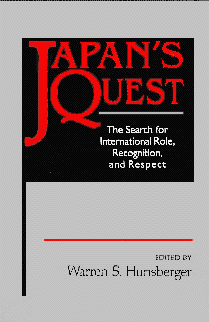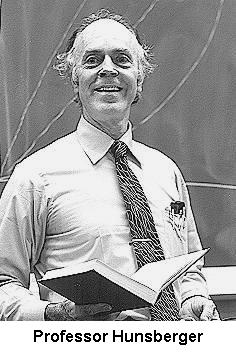 |
Japan's Quest:The Search for International Role, Recognition, and RespectEdited by Warren S. HunsbergerFormer Chief of Research on Japan and Korea, and later, Chief, Division of Research for Far East, U.S. Department of State Author of Japan and the United States in World Trade. Assisted by Richard B. Finn US Foreign Service Officer, retired Former head of the Office of Japanese Affairs, U.S. Department of State. Author of Winners in Peace: MacArthur, Yoshida, and Postwar Japan. Published by M. E. Sharpe, Inc. 80 Business Park Drive, Armonk, N.Y. 10504 Tel: 914-273-1800 or 800-541-6563; Fax: 914-273-2106. |
Three Americans, five Japanese, and one each Chinese and Korean authors examine Japan's international roles since the enforced end of isolation in the 1850's. These writers find a currently peaceable, productive, and prosperous modern democratic industrial and commercial society that has opened up incompletely to international living, with a record of many superlative achievements, some colossal failures, and some serious current problems that bear strong resemblance to those of other leading industrial countries. Japan's basic strategy since the mid-nineteenth century has been to seek attractive foreign models, select, copy, adopt, and adapt. Phenomenal achievements have resulted. But now that Japan has caught up, there is a dearth of foreign models. Japan is approaching the twenty-first century with much reduced confidence. Its consensus society is not well prepared to deal with the unknown or unexpected. The Japanese people have not squarely faced the implications and obligations of vast economic power, nor the need to devote resources and attention to keeping peace in an increasingly interconnected world. These failures reflect lingering Japanese insularity and the trauma of defeat in World War II, and a strong residual dependence on the United States, Japan's benefactor and patron after Japan's surrender. |
 |
|
In his concluding chapter the editor attempts a summary of Japan today. He finds no threat to any other nation or people from the Japanese nation, despite the many strengths and fierce competitive ways of Japanese business companies. He concludes that Japan can become a progressively stronger force for peace, for international efforts to deal with problems such as terrorism, AIDS, environmental degradation, and resource depletion, and for economic advance in Asia and throughout the globe. But Japan is not -- yet -- a leader, despite preeminence in many fields. The United States must lead, notably in the growing task of working out with a resurgent China cooperative international methods of dealing with opportunities and also disputes and dangers. Japan can make vast contributions as a partner in such historic work. |
Contents |
|
 |
| An East Gate Book Hardcover 1-56324-841-7 Paperback 1-56324-842-5 304pp |
Visit the Publisher's Web site at www.mesharpe.com Order this book through any bookstore or direct from the Publisher. |
This web site is maintained by David H. Hunsberger. Please e-mail comments concerning this site to davidhuns@aol.com |